
|
 |
 |
 |
 |
 |
** This is an archived, static copy of the Casebook messages boards dating from 1998 to 2003. These threads cannot be replied to here. If you want to participate in our current forums please go to https://forum.casebook.org **
Archive through July 06, 2000
Casebook Message Boards: General Discussion: General Topics:
Task Analyses:
Archive through July 06, 2000
Author: Jill De Schrijver
Tuesday, 04 July 2000 - 08:06 am |        | Hi All, Diana
After Diana's proposition to Dr. Ind if he could make a task analyses of hysterectomy and one between Nichols and Chapman, I felt it could be valuable to do them on all victims, also the gray area ones.
I have just finished the one on Tabram. The tasks are generally split into pre-attack, attack, after-attack and assessment. There are 3 different tasks: Collecting Data (Data), assessing data (Decision: Decn) and actions (Process: Pr of Prcs). If two actions were te be done in combination with each other I split the process up in a/b. I have a visual workflow chart of it, but I still have not found how to convert it into a loadable file. In total there are 25 actions to take, of which only 7 as a combi. Thirteen times data is collected and the same amount a decision has to be made.
PRE ATTACK
Data 1 Search woman, weak, alone, drunk, and approachable -> Decn1 Found her?
Pr 1a/b Walk up to her / Let her approach me
Pr 2a/b Do a proposition / Let her do the proposition -> Decn 2 Agreed?
Pr 3a/b Walk with her to her place of action / Talk with the woman
Data 2 Calculate surrounding traffic (PC's, people)
Prcs 4 Arrive at place of action
Data 3 Assess information of place: is it dark enough, calculating escape ways, checking the observation of noise of possible intruders ->Decn 3 Is the place OK?
ATTACK
Decn 4 Is she paying attention?
Prcs 5 Pick knife
Pr 6a/b Lift knife up / jump
Pr 7a/b grab the victim / stab with knife in throat
Pr 8a/b stab a few more times in throat / pull the victim down
Data 4 check for noise ->Decn 5 Is all at peace?
Prcs 9 sit accross victim
Prcs 10 stab chest, breasts
Data 5 Victim shows pain constantly
Data 6 Feedback of chest while stabbed ->Decn 6 Do I like the feedback of stabbing the chest?
Prcs 11 stab underneath breasts
Prcs 12 move more back over victim, still sitting accross it
Data 7 check for noise ->Decn 7 Is all at peace?
Prcs 13 lift up skirts
Prcs 14 stab abdomen
Data 8 Feedback of abdomen while stabbed ->Decn 8 Do I like the feedback of stabbing the abdomen?
Prcs 15 stab / hurt pubic area
Data 9 Feedback of pubic area while hurt ->Decn 9 Do I like the feedback of hurting the pubic area?
Prcs 16 grab dagger thing
Pr 17a/b heave it above the head / stretch
Prcs 18 stab in chest again
Data 10 Victim dies
AFTER ATTACK
Prcs 20 stand straight up
Data 11 check for noise ->Decn 10 Is all at peace?
Prcs 21 bend the woman's legs
Data 12 look at the sight of it ->Decn 11 Do I like the sight of it?
Prcs 22 pick up the knives
Prcs 23 put the knives away
Prcs 24 walk down the stairs
Data 13 look for possible witnesses ->Decn 12 Is it safe to walk out of this place?
Prcs 25 walk out on the street and away.
ASSESSMENT PERIOD
Decn 13 Did I like the victim being in pain?
Note on the text: clearly I have written down the texts as thinking process of the brain of JtR talking to himself. That is also the reason that I at some point describe Martha as 'it', and all of the tasks have a very unpersonal feeling towards Martha. This would be as JtR himself would see her. |
Author: Jill De Schrijver
Tuesday, 04 July 2000 - 09:01 am |        | Pre-Attack flowchart (referring to post above as legend)
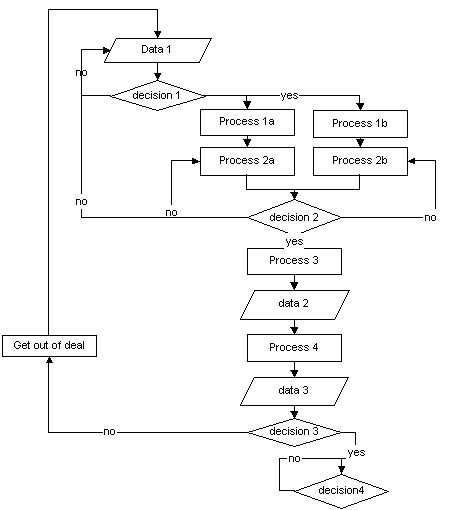 |
Author: Jill De Schrijver
Tuesday, 04 July 2000 - 09:03 am |        | Attack flowchart (referring to post above as legend)
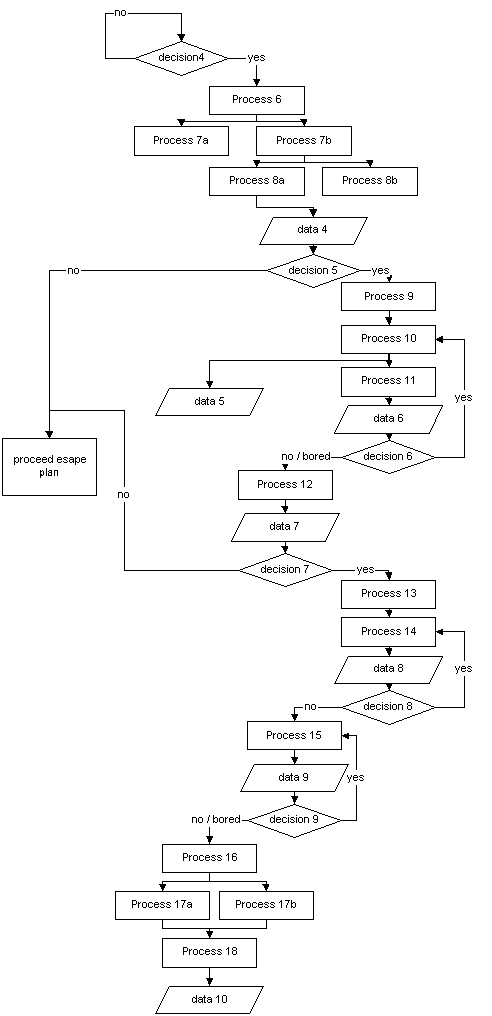 |
Author: David M. Radka
Tuesday, 04 July 2000 - 09:05 am |        | Jill,
This is a neat task analysis. To my mind, it reduces the liklihood that JtR killed Martha Tabram, because it points to a considerable difference in the MO compared to the other murders. Usually JtR killed painlessly, causing the bare minimum of pain and suffering to his victim, probably to reduce the noise level as much as possible and to increase his time-efficiency at the scene of the crime. The idea of him using up his precious minutes to determine whether or not he enjoyed doing various things to his victim seems quite antithetical to the canonical murders, doesn't it?
You've come up with a very reasonable piece of work. Thank you.
David |
Author: Jill De Schrijver
Tuesday, 04 July 2000 - 09:35 am |        | Actually David,
All this decision and feedback assesments goes so rapid that JtR never was aware of them himself, but these feedback assesments must have happened with Nichols, Chapman, Eddowes and MJK. He was murdering because he felt the need, and to have pleasure from it, you need feedback, sensitory feedback. All I have done is identifying this mental proces. I could do the same thing for you in a walking process taskflow, although you are not consiously aware that your brain is saying, as a figure of speech "now lift up the left heel, bend the knee, lift up thigh, tighten muscles, ..."
As reply to your comment of JTR's need in the fact that his victims were dead -> See my theory on the mental process link between Tabram and Nichols under the Victims->Specific Victims->Martha Tabram board. As JtR's first he would not have yet known that he liked it more that they were dead instead of alive. Even this fact would be a feedback learning fase -> the reason why I made the task decn 13 'Do I like the victim being in pain?'. It is this sole question, which would have bothered him consciously after the murder and is the bases of my theory in the change from stabbing to ripping.
Greetings,
Jill |
Author: Jill De Schrijver
Tuesday, 04 July 2000 - 10:07 am |        | After-Attack and Assessment flowchart
legend:
Data 5 Victim is in constant pain
Data 10 Victim dies
AFTER ATTACK
Prcs 19 stand straight up
Data 11 check for noise ->Decn 10 Is all at peace?
Prcs 20 bend the woman's legs
Data 12 look at the sight of it ->Decn 11 Do I like the sight of it?
Prcs 21 pick up the knives
Prcs 22a/b put the knives away / walk down the stairs
Data 13 look for possible witnesses ->Decn 12 Is it safe to walk out of this place?
Prcs 23 walk out on the street and away.
ASSESSMENT PERIOD
Decn 13 Did I like the victim being in pain?
I repeat that all the decisions and data collection is subconsious and very rapidly, except for decn 2 'agreed?'. For example: After Martha died, JtR stands up, still certain that noone is coming, he bends her legs in the manner she was found. While he takes a last look at his accomplishment for a second, he picks up the knives and stashes them away wile walking down the stairs. It is not because I identify these processes that they take a lot of time, only a millionth of a nanosec.
During the assesment period, something would have bothered JtR, and it would take a bit of time before he realises that it would be data 5 'the victim in constant pain'. It is only then that he finds out for himself that he doesn't like that (decn 13), and so a solution for it must be found.
 |
Author: Jill De Schrijver
Tuesday, 04 July 2000 - 10:10 am |        | Sorry, try again
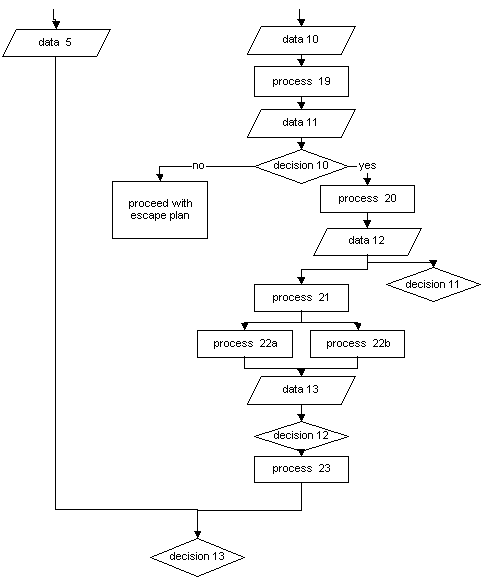 |
Author: Diana
Tuesday, 04 July 2000 - 11:43 am |        | | There is another possible scenario to the Tabram killing. It is probable that Jack was physically dysfunctional in some way. This is evidenced by the fact that there were never any bodily secretions found at the crime scenes. Since this was the case with Tabram as well as the 5 canonical victims it argues for her inclusion. Chikatilo's second murder happened because he tried to have normal relations with a young woman. When he was unable to function and she laughed and mocked, he flew into a rage and killed her. It was rage that caused him to kill and mutilate #2 but while the process was going on he gradually began to discover that the things he was doing out of rage were also giving him pleasure. Before I ever read of Chikatilo I wondered if something like that had happened with JtR and Tabram. Someone pointed out that the many stab wounds on Tabram were indicative of rage. Either Tabram did something to make him mad, or it was internal rage that was truly directed at some woman he was unable to hurt (his mother?) and taken out on Tabram. |
Author: Jill De Schrijver
Tuesday, 04 July 2000 - 12:26 pm |        | Hi Diana,
I belief that both possibilities were interpretations I had of what had set the killer of: in a post of November in the Tabram thread I belief, after the drawings I have put there
Yes, I agree with you, although nowadays I think he was already on the prowl.
Greetings,
Jill |
Author: Simon Owen
Tuesday, 04 July 2000 - 07:09 pm |        | My humble opinion on Tabram's murder is that the killer didn't set out to kill , but he failed sexually with Martha , who then humiliated him. So he took out his fury on her.
What doesn't add up , if Tabram was a JtR victim , is how the killer progressed to cutting up the woman and taking her organs. What was his inspiration for this and where did he get it? |
Author: Diana
Tuesday, 04 July 2000 - 07:33 pm |        | | The Chikatilo book says that Andrei Chikatilo discovered almost by accident that mutilating the exterior organs of generation did something for him (ugh!). From there he proceeded to hysterectomy. As a rule, I believe these sickos have to go a little farther each time. |
Author: Jill De Schrijver
Wednesday, 05 July 2000 - 06:17 am |        | Hi Diana, Simon
I agree with Diana here, JtR wanted to go on further and further each time. In the beginning SK's are finding out what they like, until they find out. I see the progress of a SK as follows: first he has to learn to catch a victim (how he learned this either by accident, or by training does not matter). When he finally catches one he'll do what he fantasised of what he would want to do with a victim. Of course the reality is not what he thought it to be, because he had never before experienced really what it's like. There is a difference to what you think you would like against what you really like (I wanted once to learn and play guitar, but while playing I found out it just wasn't my thing). Now he partly has to adjust his fantasy to reality.
After the first he knows how to catch a victim, so he'll keep that MO, he can concentrate better on experimenting and finding out what he in reality would love doing with it, until he finds it. From the moment he finds it, he'll explore every little tiny detail from it, going further each time again. Apparently our Jack found out soon enough he liked rummaging through intestines.
Why do I lean towards and already lurking Jack. The two elements that convinced me was the interest for the abdomen (but the avoidance of it because of wrong feedback) and the mentioned concentration on the pubic area. I had always partly ignored this, because I have found no statements regarding how many or what sort of wounds were done to her there. I had always taken it as an exageration of the press. But when I again tried to identify the 8 mistery wounds, I had to admit that the statements of Dr. Killeen indeed do refer to that part a few times, but that it probably was the press who left out the details for modesty's sake. If this had been an accidental instance rage attack, the killer would have sticked with stabbing the throat and trunk. Or when, as Diana suggests as scenario, he was already on top of her but could not perform, he would have hurted the pubic area clearly. But then an attack on the throat would not have been needed or logic from this position.
Instead we find an EXPERIMENTAL stab in the abdomen AND an extra concentration on the pubic area (whatever he had done there I'm not sure) AND multiple stabs in the abdomen AND multiple stabs in the throat. It is the combination of experiment and the different area's together that make it no accident but premeditated. JtR was already prowling for a victim.
Greetings
Jill |
Author: Jill De Schrijver
Wednesday, 05 July 2000 - 08:44 am |        | As a follow up on the kill of Martha Tabram task flowchart I have done the same thing for Nichols:
Pre-Attack:
PRE ATTACK
Data 1 Search woman, weak, alone, drunk, and approachable -> Decn1 Found her?
Pr 1a/b Walk up to her / Let her approach me
Pr 2a/b Do a proposition / Let her do the proposition -> Decn 2 Agreed?
Pr 3a/b Walk with her to her place of action / Talk with the woman
Data 2 Calculate surrounding traffic (PC's, people)
Prcs 4 Arrive at place of action
Data 3 Assess information of place: is it dark enough, calculating escape ways, checking the observation of noise of possible intruders ->Decn 3 Is the place OK?
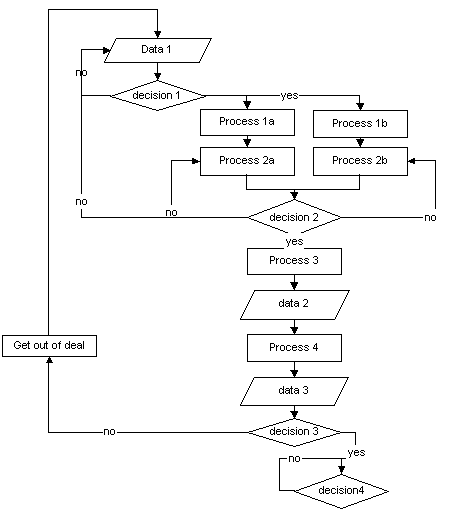
Of course this is exactly the same flowchart as with Martha because there is no need to alter this. |
Author: Jill De Schrijver
Wednesday, 05 July 2000 - 09:46 am |        | Nichols Attack Task Flowchart:
ATTACK
Decn 4Is she paying attention?
Pr 5a/b Grab her throat? / pull the victim down
Pr 6a/b Sit beside OR across victim / Strangle victim until there is no more movement
Data 4 Victims movement -> Decn 5 Does she still move?
Data 5 check for noise -> Decn 6 Is all at peace?
Prcs 7 Pick knife
Prcs 8 Pick victim's head
Prcs 9 Turn head
Prcs 10 Cut throat
Data 6 Victim dies
Data 7 check for noise ->Decn 7 Is all at peace?
Pr 11a/b Move a bit back / Lift skirts
Prcs 12 Run knife accross abdomen ( these are the three cuts running downwards on the right side and others)
Data 8 Feedback of abdomen while cut: how knife enters tissue ->Decn 8 Do I like the feedback of tissues cut?
Prcs 13 Run knife more deep into abdomen (deep jagged wound on the left side)
Data 9 check for noise
Decn 9 Is all at peace?
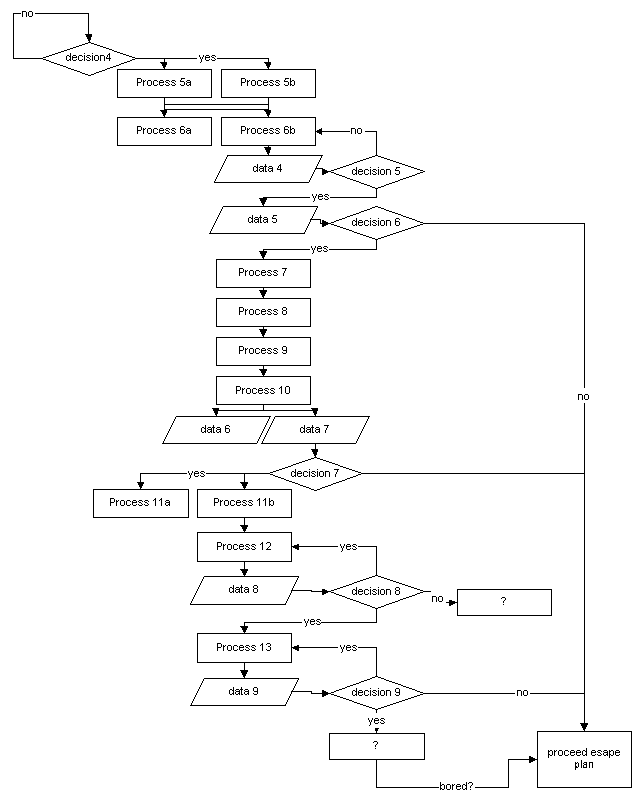 |
Author: Jill De Schrijver
Wednesday, 05 July 2000 - 10:15 am |        | Nichols After Attack Flowchart OR Escape Plan flowchart AND Assessment Flowchart:
AFTER ATTACK
Prcs 14 Stand straight up
Data 11 Check for noise ->Decn 11 Is all at peace?
Pr 15a/b Put the knive away / walk down the street
Data 12 Look for possible witnesses ->Decn 12 Is it safe to walk into this street?
Prcs 16 Walk out on the street and away.
ASSESSMENT PERIOD
Data 13 Reassess cut motions and feedback
Decn 13 Did I like the cutting?
Decn 14 What do I want to do with the cutting?
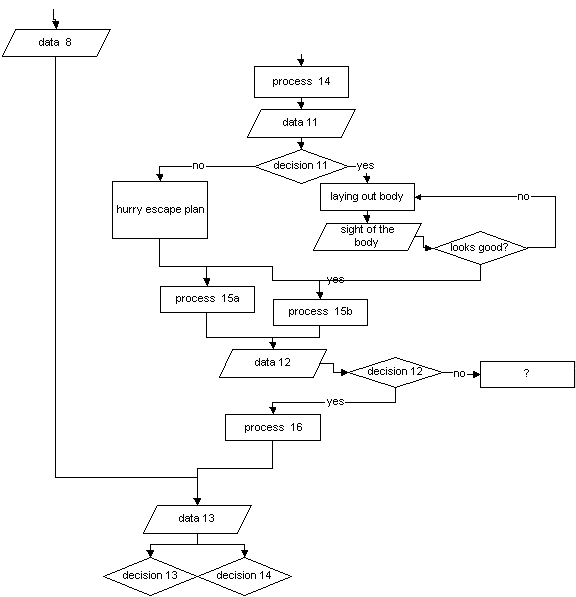 |
Author: Jill De Schrijver
Wednesday, 05 July 2000 - 10:55 am |        | Hi All,
Both in the attack and after-attack flowchart there are indications, that JtR had to dash.
The indication in the attack chart is to be found in the checking of noise after cutting Nichols deep into the abdomen. JtR is clearly experimenting with his knife on the abdomen. This is not only deductable in the flowchart also because the incisions done to Nichols differ constantly in directions, deepness and form (to be found in description of post-mortem and as seen on my drawing of her). But the experiment stops, at a moment it would be logic in the flow-chart to check if somebody's coming. He does not proceed any further, and I have the suspicion he was not yet bored at that particular moment. Either he knew a PC would soon be coming into his direction, because he knew the timing of it, or and I think that's more likely, because he heard noises still far away enough to have time to escape.
What underlines this suspicion is that JtR interrupts the flowchart of leaving the scene. He does not bother with the lay-out of Nichols at all, as he (IMHO) had done with Tabram, Chapman, Eddowes and MJK. And according to tasking this would be one the first things he would skip to speed up his get-away.
Jill |
Author: Jon
Wednesday, 05 July 2000 - 01:11 pm |        | Jill
It has been deduced for some time by many individuals that Jack was interrupted in his attack on Nichols.
Regardless of what you see in the chart.
The chart may be useful as part of a manual for serial killers........or for programing C3PO to be Jack the Ripper. |
Author: Diana
Wednesday, 05 July 2000 - 01:23 pm |        | | Aw Jon, You're just mad cause you didn't think of it first! (-: |
Author: Jill De Schrijver
Wednesday, 05 July 2000 - 03:06 pm |        | Hi Jon,
I never claim to be the genius who deduct something first. Making these, helps 'me' to understand the learning proces and see what possibilities there were with every intent, particularly which JtR evidently didn't take. Before this I myself was not yet convinced he was interrupted with Nichols. I saw no reason first why he should want anything to do with intestines with Nichols, because on later victims he did, since he was finding out what he liked or not. I analysed every timeline of every passer-by that I could make-up. And in none I saw a conclusive answer if he was interrupted or not. But the flowchart did. If it helped 'me', it will help others too.
Greetings,
Jill
PS: And again I think I have to agree with Diana :-) My we are one-minded, aren't we Diana? |
Author: Diana
Wednesday, 05 July 2000 - 05:26 pm |        | | I'll be anxious to see your flowchart of Stride. Studying your analyses (I paid more attention to the written out part than the diagram because I am a verbal learner) I began to sharpen my perception of his evolving attack ritual. It is possible that that ritual was interrupted in the case of Stride when he was observed by Israel Schwartz and pipeman. He cannot allow Stride to live because she might report him and by this time fear of the Ripper had reached fever pitch. He could be torn to pieces by a mob. If the police get him he will surely be hanged. So he goes into a modified routine designed only to kill and escape. He can't remain on the street to continue the murder because he has been seen and for all he knows, Schwartz has run off to fetch a cop. It is risky to go into Dutfield's Yard with the Socialist meeting going on, but less risky than staying where he is. He counts on the area behind the gate being practically devoid of light. He drags Stride into the yard (I don't think I'm reaching here -- when Schwartz last saw her she was already down) and dispatches her quickly. He either escapes before the arrival of Diemschutz or hides behind the gate until Diemschutz goes into the club and then escapes. The nice thing about your flowcharts is that they take things we already knew in a hazy sort of way and forces us to focus on the details and on emergent patterns of behavior. |
|
 |
 |
|